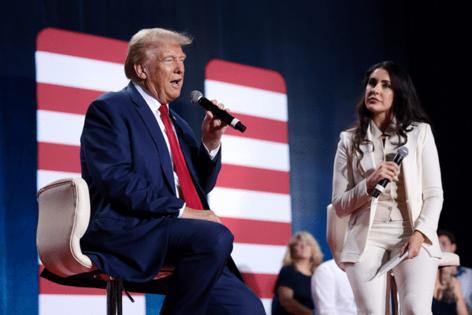Tyler Cowen: What's the best way to reveal a government secret?
Published in Op Eds
House Republicans last week announced their “Task Force on the Declassification of Federal Secrets.” This follows an executive order issued last month by President Donald Trump ordering the release of records about the assassinations of John F. Kennedy, Robert F. Kennedy and Martin Luther King. The broad idea is to get the federal government to reveal all its information about these assassinations as well as topics like Jeffrey Epstein, the origins of COVID-19 and UAPs (formerly known as UFOs).
Rather than speculate about whether Trump and Congress will follow through, I would like to focus on the question of how this disclosure process should work.
The first and arguably most important question is who exactly has the authority to order the declassification and publication. Ideally, the head of the congressional task force should be a credible and independent person trusted by the bureaucracy and by the national security establishment. That person should be able to declassify documents without requiring approval from the president. On first glance, the current arrangement does not seem to allow that.
The risk is that Trump would hoard the most sensitive information and disclose selectively, to manipulate the news cycle or to distract attention from other events. It also could give him more political weapons to use against what he calls the “deep state.” The president himself is hardly a model of transparency, whether the questions concern his tax returns, his medical exams or the possession of classified documents after leaving office.
But again, the issue is governmental disclosure, and so far, Trump’s record is 0 for 1. Before assuming office, he suggested that the U.S. military knew more than it was letting on about the drones that had been sighted above New Jersey and other Northeastern states. Then, after Trump took office, his press secretary said only that they were “authorized” by the government “for research and various other reasons.” There has been no subsequent attempt to clarify matters. Personally, I am more confused than I was a month ago.
Perhaps there are good national security reasons for this silence. The point is that it is foolish to expect full and open disclosure from the president, no matter what his executive order says or what he has earlier promised.
One way to improve the process would be to appoint some independent auditors on a bipartisan basis, perhaps selected from Congress. Ex post, those auditors could judge whether disclosure, with transparent explanations, had actually occurred. They could grade the degree of disclosure, but they would not have the power to prevent it. Otherwise, there is a risk that — to choose an example not quite at random — evidence favoring the “two gunmen” hypothesis for JFK’s assassination is released, but conflicting evidence for the “lone gunman” hypothesis is suppressed. The auditors would issue a report saying whether disclosure was unbalanced or unfair.
The Republican heading the task force, Rep. Anna Paulina Luna of Florida, is well suited for the job in the sense that she has had a strong interest in disclosure and transparency, and she is not building her career by courting establishment approval.
On the other hand, she is not the most credible spokesperson for the cause of disclosure. She has a partisan and contentious political history, recently introducing a bill to have Trump’s face carved into Mount Rushmore. The letter she sent soliciting information for disclosure slams President Joe Biden’s administration, hardly a move designed to build a consensus in favor of the process or its outcomes. The cause of transparency is best served when it is not partisan.
Another problem with the task force is that it is authorized for only six months. Bureaucracies are by nature slow-moving, and can be even more so when they wish to be. A six-month deadline creates incentives to wait things out. Trump could threaten to extend the mandate, and perhaps he will. But then the disclosure campaign would turn out to be just a bargaining chip, rather than a genuine attempt to bring the truth to light.
Mostly I favor this new policy, if only because so little progress has been made under the status quo. Above all else, I am a curious human being, and if handled properly, this task force could be revelatory. But there are also plenty of ways it could go wrong, so I am also curious to see how it all plays out.
____
This column does not necessarily reflect the opinion of the editorial board or Bloomberg LP and its owners.
Tyler Cowen is a Bloomberg Opinion columnist, a professor of economics at George Mason University and host of the Marginal Revolution blog.
©2025 Bloomberg L.P. Visit bloomberg.com/opinion. Distributed by Tribune Content Agency, LLC.




























































Comments